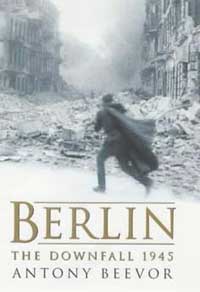Reception
Scottish newspaper The Herald , after summarizing the novel's warm critical reception in other publications, called it "a gripping narrative which brings vividly to life the confusion, cruelty, courage and madness of the time, illustrated by eye-witness accounts and vignettes from diaries". [4]
The book encountered criticism, especially in Russia, [5] centering on the book's discussion of atrocities committed by the Red Army against German civilians. In particular, the book describes widespread rape of German women and female Soviet forced labourers, both before and after the war. The Russian ambassador to the UK denounced the book as "lies" and "slander against the people who saved the world from Nazism". [6]
Oleg Rzheshevsky, a professor and the president of the Russian Association of World War II Historians, has stated that Beevor is merely resurrecting the discredited and racist views of Neo-Nazi historians, who depicted Soviet troops as subhuman "Asiatic hordes". [7] He argues that Beevor's use of phrases such as "Berliners remember" and "the experiences of the raped German women" were better suited "for pulp fiction, than scientific research". Rzheshevsky also stated that the Germans could have expected an "avalanche of revenge" after what they did in the Soviet Union, but "that did not happen". [8]
Beevor responded by stating that he used excerpts from the report of General Tsigankov, the chief of the political department of the 1st Ukrainian Front, as a source. He wrote: "the bulk of the evidence on the subject came from Soviet sources, especially the NKVD reports in GARF (State Archive of the Russian Federation), and a wide range of reliable personal accounts". [9] Beevor also stated that he hopes Russian historians will "take a more objective approach to material in their own archives which are at odds to the heroic myth of the Red Army as 'liberators' in 1945". [10]
UK historian Richard Overy, from the University of Exeter, has criticized Russian reaction to the book and defended Beevor. Overy accused the Russians of refusing to acknowledge Soviet war crimes, "Partly this is because they felt that much of it was justified vengeance against an enemy who committed much worse, and partly it was because they were writing the victors' history". [8]
This page is based on this
Wikipedia article Text is available under the
CC BY-SA 4.0 license; additional terms may apply.
Images, videos and audio are available under their respective licenses.
